UNIT 9 HUMAN BIOLOGY Part 3 LESSON 2 BRAIN POWER分层练习(含解析)
文档属性
| 名称 | UNIT 9 HUMAN BIOLOGY Part 3 LESSON 2 BRAIN POWER分层练习(含解析) | 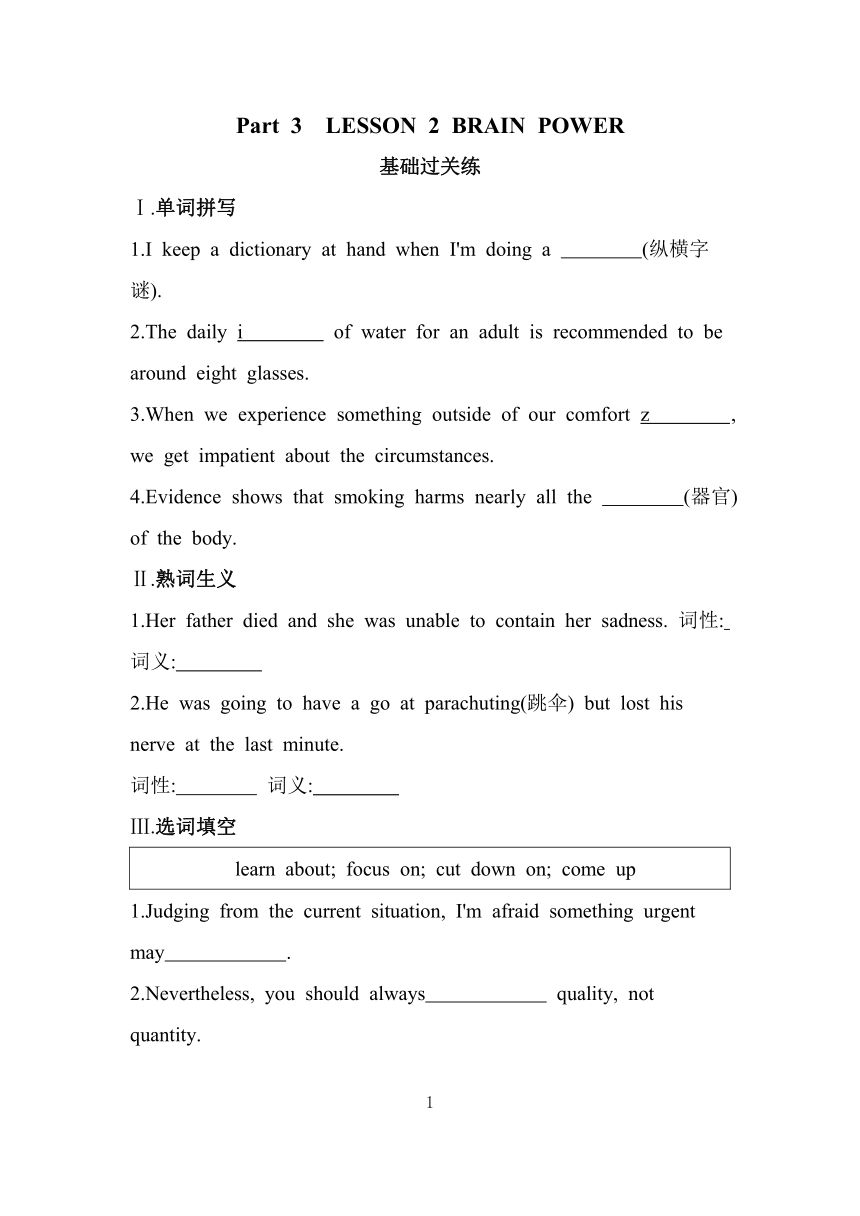 | |
| 格式 | docx | ||
| 文件大小 | 38.2KB | ||
| 资源类型 | 试卷 | ||
| 版本资源 | 北师大版(2019) | ||
| 科目 | 英语 | ||
| 更新时间 | 2025-10-28 18:05:27 | ||
图片预览

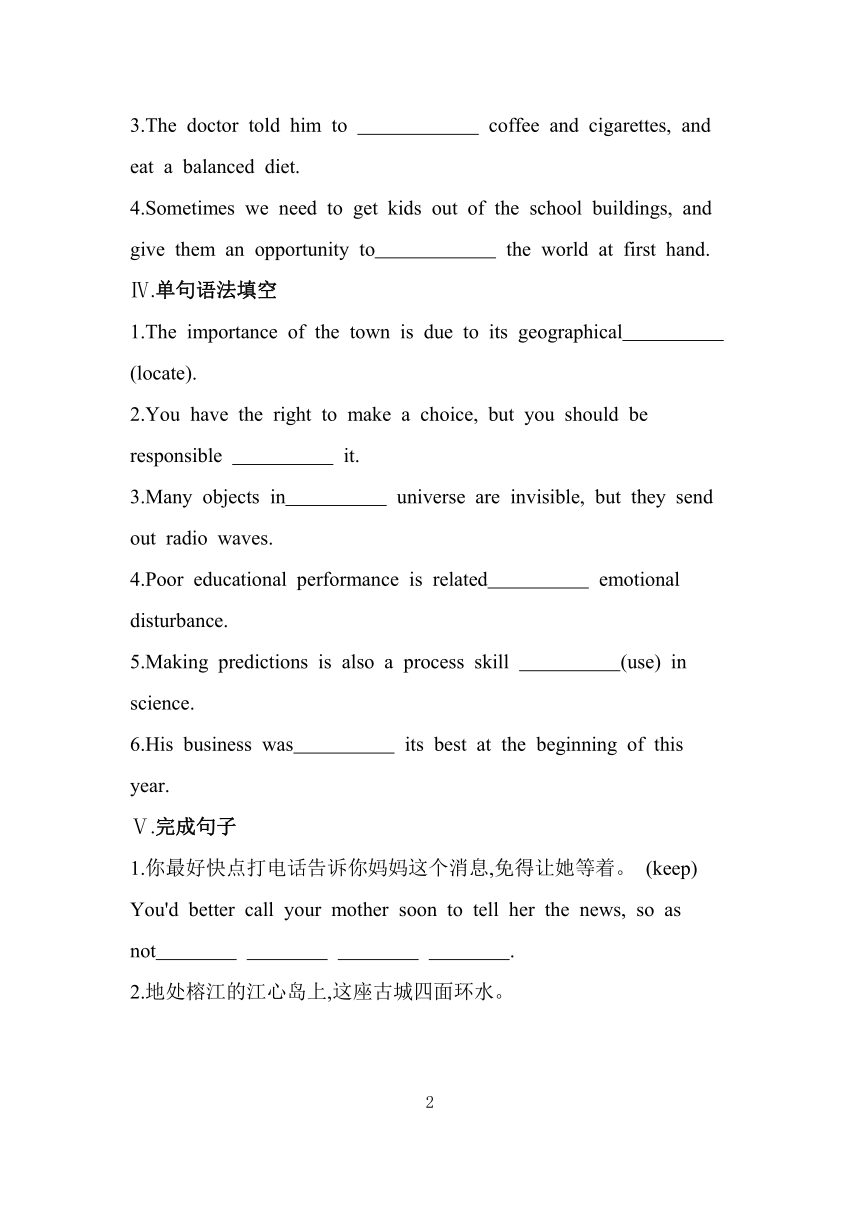
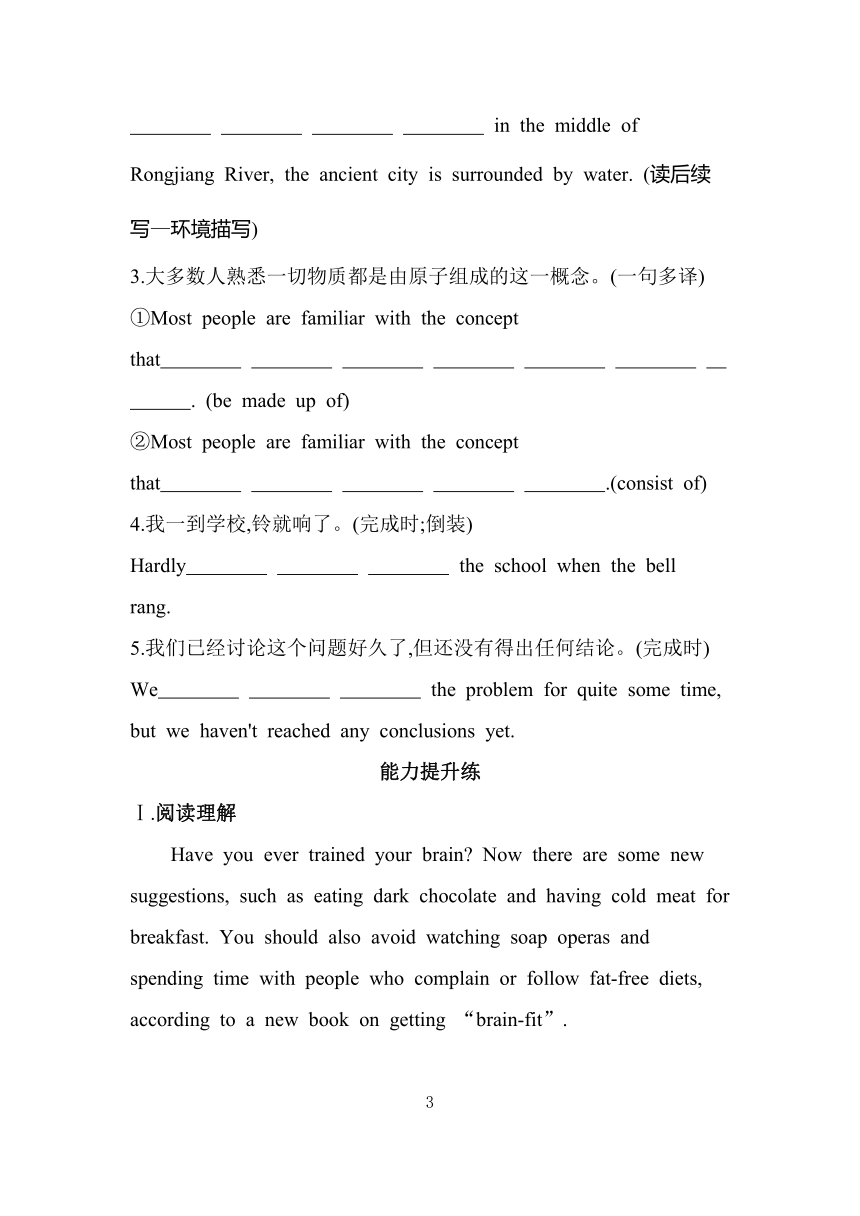
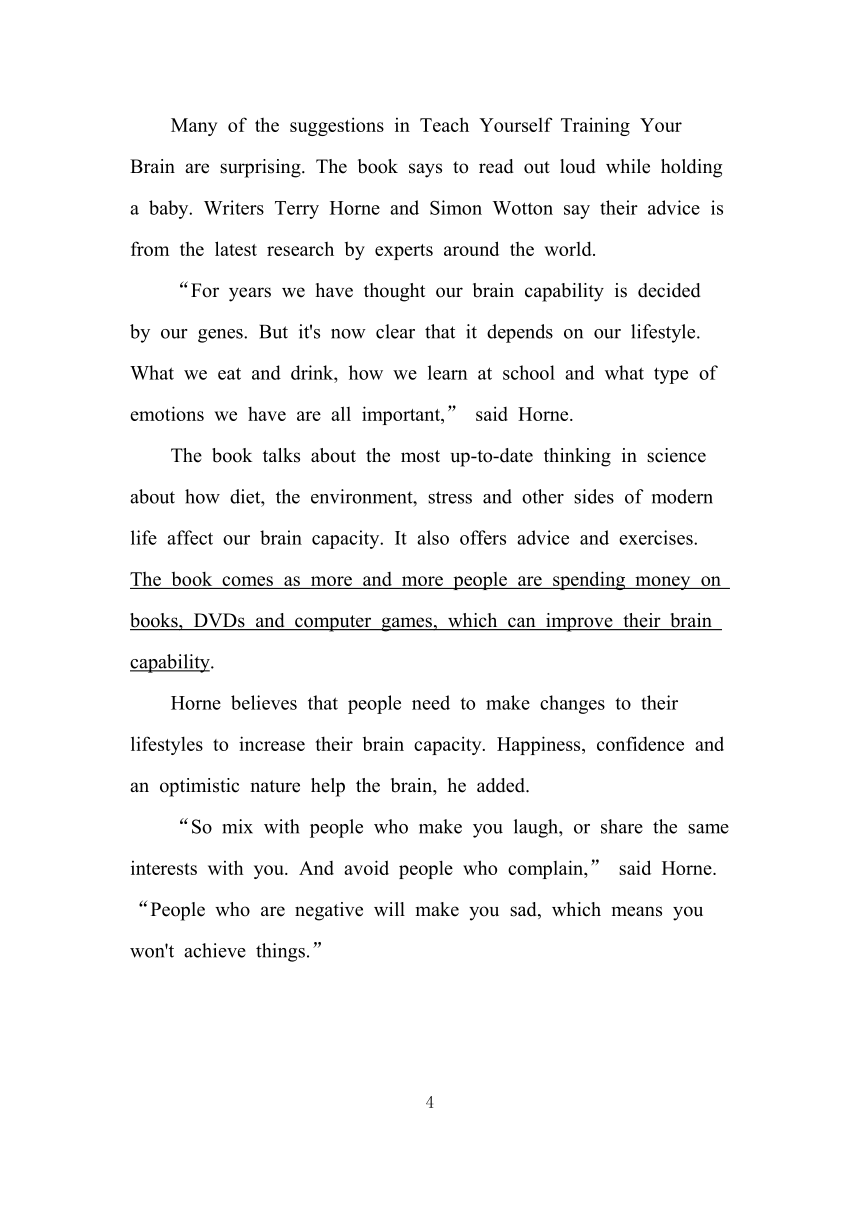
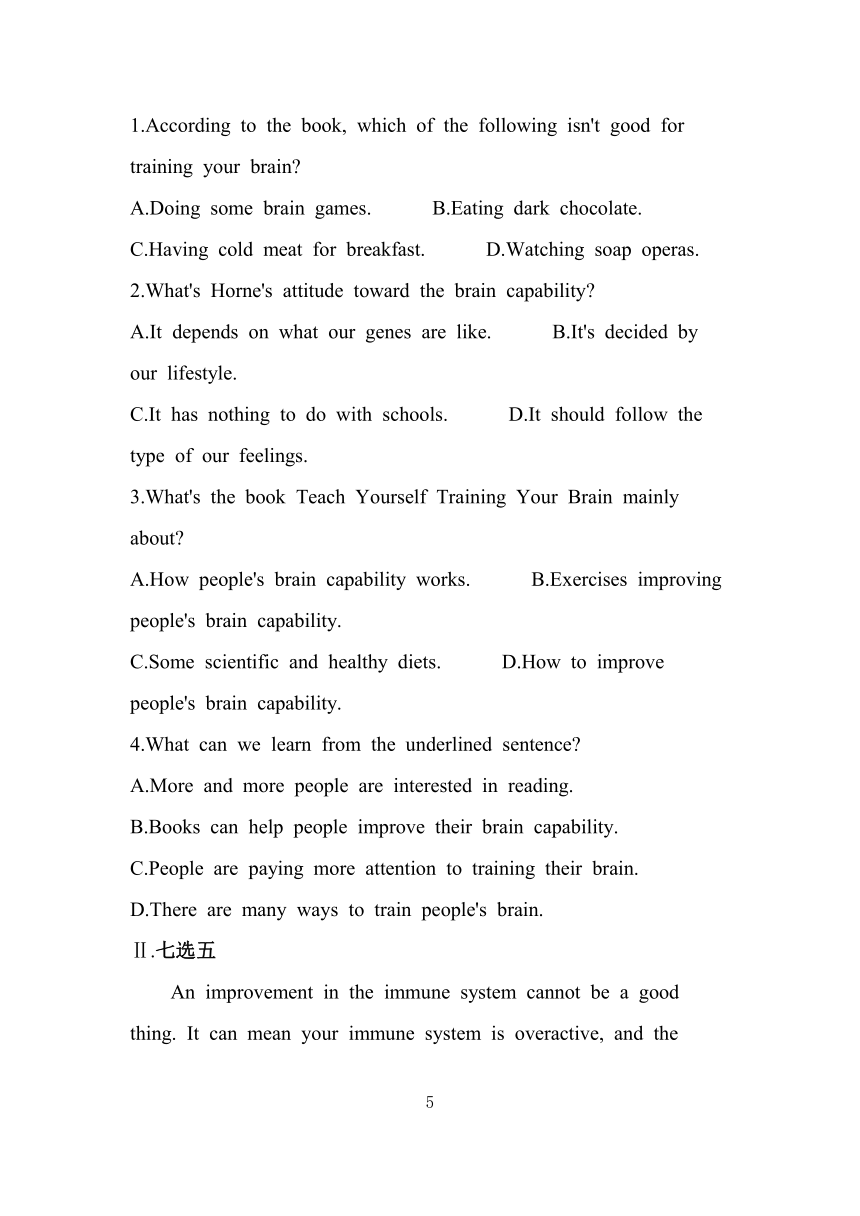
文档简介
Part 3 LESSON 2 BRAIN POWER
基础过关练
Ⅰ.单词拼写
1.I keep a dictionary at hand when I'm doing a (纵横字谜).
2.The daily i of water for an adult is recommended to be around eight glasses.
3.When we experience something outside of our comfort z , we get impatient about the circumstances.
4.Evidence shows that smoking harms nearly all the (器官) of the body.
Ⅱ.熟词生义
1.Her father died and she was unable to contain her sadness. 词性: 词义:
2.He was going to have a go at parachuting(跳伞) but lost his nerve at the last minute.
词性: 词义:
Ⅲ.选词填空
learn about; focus on; cut down on; come up
1.Judging from the current situation, I'm afraid something urgent may .
2.Nevertheless, you should always quality, not quantity.
3.The doctor told him to coffee and cigarettes, and eat a balanced diet.
4.Sometimes we need to get kids out of the school buildings, and give them an opportunity to the world at first hand.
Ⅳ.单句语法填空
1.The importance of the town is due to its geographical (locate).
2.You have the right to make a choice, but you should be responsible it.
3.Many objects in universe are invisible, but they send out radio waves.
4.Poor educational performance is related emotional disturbance.
5.Making predictions is also a process skill (use) in science.
6.His business was its best at the beginning of this year.
Ⅴ.完成句子
1.你最好快点打电话告诉你妈妈这个消息,免得让她等着。 (keep)
You'd better call your mother soon to tell her the news, so as not .
2.地处榕江的江心岛上,这座古城四面环水。
in the middle of Rongjiang River, the ancient city is surrounded by water. (读后续写—环境描写)
3.大多数人熟悉一切物质都是由原子组成的这一概念。(一句多译)
①Most people are familiar with the concept that . (be made up of)
②Most people are familiar with the concept that .(consist of)
4.我一到学校,铃就响了。(完成时;倒装)
Hardly the school when the bell rang.
5.我们已经讨论这个问题好久了,但还没有得出任何结论。(完成时)
We the problem for quite some time, but we haven't reached any conclusions yet.
能力提升练
Ⅰ.阅读理解
Have you ever trained your brain Now there are some new suggestions, such as eating dark chocolate and having cold meat for breakfast. You should also avoid watching soap operas and spending time with people who complain or follow fat-free diets, according to a new book on getting “brain-fit”.
Many of the suggestions in Teach Yourself Training Your Brain are surprising. The book says to read out loud while holding a baby. Writers Terry Horne and Simon Wotton say their advice is from the latest research by experts around the world.
“For years we have thought our brain capability is decided by our genes. But it's now clear that it depends on our lifestyle. What we eat and drink, how we learn at school and what type of emotions we have are all important,” said Horne.
The book talks about the most up-to-date thinking in science about how diet, the environment, stress and other sides of modern life affect our brain capacity. It also offers advice and exercises. The book comes as more and more people are spending money on books, DVDs and computer games, which can improve their brain capability.
Horne believes that people need to make changes to their lifestyles to increase their brain capacity. Happiness, confidence and an optimistic nature help the brain, he added.
“So mix with people who make you laugh, or share the same interests with you. And avoid people who complain,” said Horne. “People who are negative will make you sad, which means you won't achieve things.”
1.According to the book, which of the following isn't good for training your brain
A.Doing some brain games. B.Eating dark chocolate.
C.Having cold meat for breakfast. D.Watching soap operas.
2.What's Horne's attitude toward the brain capability
A.It depends on what our genes are like. B.It's decided by our lifestyle.
C.It has nothing to do with schools. D.It should follow the type of our feelings.
3.What's the book Teach Yourself Training Your Brain mainly about
A.How people's brain capability works. B.Exercises improving people's brain capability.
C.Some scientific and healthy diets. D.How to improve people's brain capability.
4.What can we learn from the underlined sentence
A.More and more people are interested in reading.
B.Books can help people improve their brain capability.
C.People are paying more attention to training their brain.
D.There are many ways to train people's brain.
Ⅱ.七选五
An improvement in the immune system cannot be a good thing. It can mean your immune system is overactive, and the overactive immune system can lead to some problems. 1 Don't worry! Here are some basic steps you can take to ensure it is normal and thus functioning.
Get enough sleep. 2 It makes your body easier to get sick and so does an irregular sleep schedule. A single night of only 4 to 5 hours of sleep causes your natural killer cells to drop by 70%. Increase your chances of fending off illness by allowing yourself a solid 7 to 9 hours of shut-eye nightly.
Eat well. Fuel your body by eating a wide range of plant-based, fiber-rich, and colorfully varied foods. There is no strong scientific evidence for any specific type of food's being linked to better immune function, so you can ignore the supplements(养生片剂) being marketed toward the coronavirus in particular. 3
Keep exercising. Exercise has many benefits. It helps to maintain immune health by getting white blood cells moving through the body. 4 If you're already feeling ill, however, you can continue exercising as long as your symptoms are above the chest. If your condition is further down, take a break for a few days.
5 This advice is everywhere these days, but don't stop paying attention to it. Keep washing your hands! It's the simplest and most effective protection against catching unwanted bacteria. Think about reducing places for bacteria to hide in, such as under long fingernails and rings, either by wearing fewer of them or by including them in your hand-scrubbing.
A.Practice good health habits.
B.Bury your bad habits in the water.
C.You might want it to function normally.
D.It boosts feelings of well-being and happiness.
E.Little sleep is like a warm welcome to illnesses.
F.Focus on getting your nutrition from wholefoods instead.
G.You are going to be good at containing and fighting it off.
1. 2. 3. 4. 5.
Ⅲ.完形填空
I was born with eye disease. At school I couldn't read things written on the blackboard. By the time I got to university it had got to the 1 where I couldn't really see images at all, only the difference between light and the dark. Once I was in the first year of my PhD, I was almost 100% 2 .
When I was young I used to get very angry if I 3 something I couldn't do because of my eyes. But over time I learned that it wasn't a helpful response. There's no point getting upset about the fact that I can't see, because it won't 4 it.
I started climbing when I was two. My dad was part of the Mountaineering Club, so we would go out on weekends 5 throughout the UK. He taught me everything I know and I led my first 6 outside when I was 11. People are usually 7 when they discover that not only do I climb, but I also lead climbs.
At university I 8 the Mountaineering Club and was able to climb much more frequently. We had regular 9 to indoor walls and the outdoors on weekends. I developed a great circle of climbing 10 and went on multiple trips to Europe.
There was a time when I thought I might have to 11 leading as my eyesight got worse. 12 , I never thought I would stop climbing. I just learnt to 13 myself to the eye disease with the support of my friends. It's quite possible that I wouldn't be so good a climber if I weren't blind—if I didn't have these 14 , I wouldn't focus on climbing. The determination is built through my 15 .
1.A.position B.level
C.point D.top
2.A.deaf B.weak
C.ill D.blind
3.A.encountered B.recognized
C.remembered D.noticed
4.A.abandon B.change
C.cheat D.defeat
5.A.walking B.travelling
C.learning D.climbing
6.A.experiment B.competition
C.team D.campaign
7.A.proud B.amazed
C.satisfied D.generous
8.A.expanded B.heard
C.joined D.recommended
9.A.meetings B.camps
C.trips D.debates
10.A.assistants B.friends
C.officers D.companies
11.A.give up B.put off
C.think over D.take up
12.A.Besides B.Therefore
C.Otherwise D.However
13.A.adapt B.expose
C.devote D.addict
14.A.challenges B.models
C.presents D.tasks
15.A.adventure B.disability
C.practice D.loneliness
Part 3 LESSON 2 BRAIN POWER
基础过关练
Ⅰ.1.crossword 2.intake 3.zone 4.organs
Ⅱ.1.动词;抑制 句意:她的父亲去世了,她无法抑制内心的悲伤。
2.名词;勇气 句意:他想尝试一下跳伞,可到最后关头却没有勇气了。
Ⅲ.1.come up 2.focus on 3.cut down on
4.learn about
Ⅳ.1.location 考查名词。句意:这座城镇的重要性在于它的地理位置。设空处作due to的宾语,根据空前的its和形容词geographical可知此处应用名词形式,故填location。
2.for 考查介词。句意:你有权利做出选择,但你应该对它负责。be responsible for...对……负责,故填for。
3.the 考查冠词。句意:宇宙中的许多物体是看不见的,但它们发出无线电波。in the universe在宇宙中。故填the。
4.to 考查固定搭配。句意:学习表现不好与情绪不稳定有关。be related to...与……有关。故填to。
5.used 考查过去分词。句意:预测也是科学中使用的一种过程技能。分析句子结构可知,设空处应用非谓语动词作后置定语,修饰名词skill,use与其逻辑主语skill构成被动关系,应用过去分词作后置定语。故填used。
6.at 考查固定搭配。句意:他的生意在今年年初是最好的。at one's best处在最佳状态。故填at。
Ⅴ.1.to keep her waiting 2.Located on the island
3.①all matter is made up of atoms ②all matter consists of atoms 4.had I reached 5.have been discussing
能力提升练
Ⅰ.◎语篇解读 本文是一篇说明文。文章介绍了一本名为《教你训练大脑》的书。这本书告诉你大脑的能力不仅由先天的基因决定,还取决于一个人的生活方式、周围环境及心理状态。
1.D 细节理解题。根据第一段第三句“You should also avoid watching soap operas and spending time with people who complain or follow fat-free diets, according to a new book on getting ‘brain-fit’.”可知,看肥皂剧不利于训练大脑。故选D项。
2.B 细节理解题。根据第三段第一、二句“For years we have thought our brain capability is decided by our genes. But it's now clear that it depends on our lifestyle.”可知,大脑的能力取决于我们的生活方式。故选B项。
3.D 细节理解题。根据第四段最后一句“The book comes as more and more people are spending money on books, DVDs and computer games, which can improve their brain capability.”可知,《教你训练大脑》这本书主要是关于如何改善人们的大脑能力的。故选D项。
4.C 推理判断题。根据第四段最后一句“The book comes as more and more people are spending money on books, DVDs and computer games, which can improve their brain capability.”可知,越来越多的人把钱花在能改善他们的大脑能力的书籍、数字视频光盘和电脑游戏上,由此可推知,人们现在更关注他们的大脑训练。故选C项。
【高频词汇】 1.complain v.抱怨 2.affect v.影响
3.optimistic adj.乐观的 4.negative adj.消极的,缺乏热情的;坏的
【熟词生义】 nature n.性格,本性
长难句
原句 People who are negative will make you sad, which means you won't achieve things.
分析 本句是主从复合句。who引导定语从句,修饰先行词People;which引导非限制性定语从句,修饰前面整个主句;you won't achieve things是省略了引导词that的宾语从句。
译文 消极的人会让你伤心,这意味着你不会有所成就。
Ⅱ.◎语篇解读 本文是一篇说明文。文章介绍了增强人体免疫力的一些有效措施。
1.C 空前提到免疫系统的增强可能并不是一件好事,那可能意味着你的免疫系统过于活跃,过于活跃的免疫系统会导致一些问题;空后提到这里有一些措施可以帮助它正常运作。C项“你可能想要它正常地工作”承上启下,符合语境。故选C项。
2.E 空前句是本段的主旨句,建议要有充足的睡眠;空后提到不规则的作息也对健康不利。E项“睡眠不足对疾病来说就像是热烈的欢迎”承上启下,符合语境。故选E项。
3.F 根据本段主旨句可知本段介绍饮食与增强免疫力的关系,没有科学证明任何特定类型的食物与增强免疫力有关,所以不用理会推销的增强免疫力的药物。F项“而是注意从天然食物中获取营养”承接上文,符合语境。故选F项。
4.D 空前提到锻炼通过让白细胞在体内流动来帮助人体保持免疫系统健康。D项“它会增加幸福感”承接上文,符合语境。故选D项。
5.A 设空处是本段主旨句,空后提到这个建议随处可见,但不要忽视,勤洗手就是防止感染病菌的最简单有效的方法。A项“养成良好的卫生习惯”引出下文,符合语境。故选A项。
【高频词汇】 1.improvement n.改善的事物;改进
2.ensure v.确保,保证 3.irregular adj.无规律的
4.in particular 尤其,特别 5.maintain v.保持,维持
【熟词生义】 market v.推销,促销
【差距词汇】 fend off抵挡
长难句
原句 There is no strong scientific evidence for any specific type of food's being linked to better immune function, so you can ignore the supplements being marketed toward the coronavirus in particular.
分析 本句为并列复合句,so连接两个并列分句。句中any specific type...immune function为动名词的复合结构,作for的宾语;being marketed toward the coronavirus in particular为现在分词短语作定语,修饰supplements。
译文 没有强有力的科学证据证明任何特定类型的食品与更好的免疫功能有联系,所以你可以忽略那些正在推销的尤其是针对冠状病毒的养生片剂。
Ⅲ.◎语篇解读 本文是一篇记叙文。文章讲述了作者虽然出生时患有眼疾,到后来完全失明,但他一直坚持爬山并不断克服困难,挑战自我的故事。
1.C 考查名词辨析。根据语境可知,当作者上大学时,眼疾已经达到了完全看不见图像的程度。point表示“程度”,后跟定语从句时常用where引导。故选C项。
2.D 考查形容词辨析。根据上文中的“eye disease”及语境可知,作者在读博士的第一年几乎完全失明(blind)了。故选D项。
3.A 考查动词辨析。根据上文中的“When I was young I used to get very angry”及语境可知,作者年轻的时候,如果遇到因自己的眼睛问题而不能做的事情,常常会非常生气。encounter意为“遭遇,遇到(尤指令人不快或困难的事)”,符合语境。故选A项。
4.B 考查动词辨析。根据上文中的“There's no point getting upset about the fact that I can't see”可知,此处指作者无法改变(change)失明的事实。故选B项。
5.D 考查动词辨析。根据上文“I started climbing when I was two.”可知,此处指作者和父亲在周末会去英国各地爬山。climb意为“爬,攀登”,符合语境。故选D项。
6.C 考查名词辨析。根据前面的“led my first”和下文中的“but I also lead climbs”可知,作者11岁时,在户外带领他的第一支队伍(team)爬山。故选C项。
7.B 考查形容词辨析。根据上文可知,作者有眼疾,从11岁就开始带队爬山,所以当人们发现作者不仅能爬山,而且还能带队爬山时,他们应该会感到惊讶(amazed)。故选B项。
8.C 考查动词辨析。根据下文中的“was able to climb much more frequently”可知,在大学时,作者加入了(joined)登山俱乐部。故选C项。
9.C 考查名词辨析。根据上文“At university I 8 the Mountaineering Club and was able to climb much more frequently.”可知,他们会定期进行室内攀岩和周末的户外旅行(trips)活动。故选C项。
10.B 考查名词辨析。根据语境可知,作者发展了一个很好的登山朋友圈。B项意为“朋友”,符合语境。故选B项。
11.A 考查动词短语辨析。根据下文中的“as my eyesight got worse”可知,有一段时间,作者觉得自己可能不得不放弃(give up)带队爬山,因为作者的视力越来越差。故选A项。
12.D 考查副词辨析。根据下文中的“I never thought I would stop climbing”及语境可知,虽然作者的视力越来越差,然而(However)作者从未想过自己会停止攀登,前后为转折关系。故选D项。
13.A 考查动词辨析。根据语境可知,作者在朋友们的支持下,学会了去适应(adapt)眼疾。故选A项。
14.A 考查名词辨析。根据语境可知,此处指如果作者没有遇到这些挑战(challenges)。故选A项。
15.B 考查名词辨析。根据“It's quite possible that I wouldn't be so good a climber if I weren't blind”可知,作者的这种决心是通过作者的缺陷(disability)建立起来的。故选B项。
【高频词汇】 1.response n.反应,响应 2.frequently adv.频繁地 3.regular adj.有规律的;定期的
4.multiple adj.数量多的;多种多样的 5.focus on 关注
6.determination n.决心
长难句
原句 There's no point getting upset about the fact that I can't see, because it won't change it.
分析 本句是一个主从复合句。句型“There's no point doing sth.”意为“做某事毫无意义”;that I can't see为同位语从句,说明前面名词fact的具体内容;because引导原因状语从句。
译文 因我看不见这一事实而烦恼毫无意义,因为这改变不了事实。
3
基础过关练
Ⅰ.单词拼写
1.I keep a dictionary at hand when I'm doing a (纵横字谜).
2.The daily i of water for an adult is recommended to be around eight glasses.
3.When we experience something outside of our comfort z , we get impatient about the circumstances.
4.Evidence shows that smoking harms nearly all the (器官) of the body.
Ⅱ.熟词生义
1.Her father died and she was unable to contain her sadness. 词性: 词义:
2.He was going to have a go at parachuting(跳伞) but lost his nerve at the last minute.
词性: 词义:
Ⅲ.选词填空
learn about; focus on; cut down on; come up
1.Judging from the current situation, I'm afraid something urgent may .
2.Nevertheless, you should always quality, not quantity.
3.The doctor told him to coffee and cigarettes, and eat a balanced diet.
4.Sometimes we need to get kids out of the school buildings, and give them an opportunity to the world at first hand.
Ⅳ.单句语法填空
1.The importance of the town is due to its geographical (locate).
2.You have the right to make a choice, but you should be responsible it.
3.Many objects in universe are invisible, but they send out radio waves.
4.Poor educational performance is related emotional disturbance.
5.Making predictions is also a process skill (use) in science.
6.His business was its best at the beginning of this year.
Ⅴ.完成句子
1.你最好快点打电话告诉你妈妈这个消息,免得让她等着。 (keep)
You'd better call your mother soon to tell her the news, so as not .
2.地处榕江的江心岛上,这座古城四面环水。
in the middle of Rongjiang River, the ancient city is surrounded by water. (读后续写—环境描写)
3.大多数人熟悉一切物质都是由原子组成的这一概念。(一句多译)
①Most people are familiar with the concept that . (be made up of)
②Most people are familiar with the concept that .(consist of)
4.我一到学校,铃就响了。(完成时;倒装)
Hardly the school when the bell rang.
5.我们已经讨论这个问题好久了,但还没有得出任何结论。(完成时)
We the problem for quite some time, but we haven't reached any conclusions yet.
能力提升练
Ⅰ.阅读理解
Have you ever trained your brain Now there are some new suggestions, such as eating dark chocolate and having cold meat for breakfast. You should also avoid watching soap operas and spending time with people who complain or follow fat-free diets, according to a new book on getting “brain-fit”.
Many of the suggestions in Teach Yourself Training Your Brain are surprising. The book says to read out loud while holding a baby. Writers Terry Horne and Simon Wotton say their advice is from the latest research by experts around the world.
“For years we have thought our brain capability is decided by our genes. But it's now clear that it depends on our lifestyle. What we eat and drink, how we learn at school and what type of emotions we have are all important,” said Horne.
The book talks about the most up-to-date thinking in science about how diet, the environment, stress and other sides of modern life affect our brain capacity. It also offers advice and exercises. The book comes as more and more people are spending money on books, DVDs and computer games, which can improve their brain capability.
Horne believes that people need to make changes to their lifestyles to increase their brain capacity. Happiness, confidence and an optimistic nature help the brain, he added.
“So mix with people who make you laugh, or share the same interests with you. And avoid people who complain,” said Horne. “People who are negative will make you sad, which means you won't achieve things.”
1.According to the book, which of the following isn't good for training your brain
A.Doing some brain games. B.Eating dark chocolate.
C.Having cold meat for breakfast. D.Watching soap operas.
2.What's Horne's attitude toward the brain capability
A.It depends on what our genes are like. B.It's decided by our lifestyle.
C.It has nothing to do with schools. D.It should follow the type of our feelings.
3.What's the book Teach Yourself Training Your Brain mainly about
A.How people's brain capability works. B.Exercises improving people's brain capability.
C.Some scientific and healthy diets. D.How to improve people's brain capability.
4.What can we learn from the underlined sentence
A.More and more people are interested in reading.
B.Books can help people improve their brain capability.
C.People are paying more attention to training their brain.
D.There are many ways to train people's brain.
Ⅱ.七选五
An improvement in the immune system cannot be a good thing. It can mean your immune system is overactive, and the overactive immune system can lead to some problems. 1 Don't worry! Here are some basic steps you can take to ensure it is normal and thus functioning.
Get enough sleep. 2 It makes your body easier to get sick and so does an irregular sleep schedule. A single night of only 4 to 5 hours of sleep causes your natural killer cells to drop by 70%. Increase your chances of fending off illness by allowing yourself a solid 7 to 9 hours of shut-eye nightly.
Eat well. Fuel your body by eating a wide range of plant-based, fiber-rich, and colorfully varied foods. There is no strong scientific evidence for any specific type of food's being linked to better immune function, so you can ignore the supplements(养生片剂) being marketed toward the coronavirus in particular. 3
Keep exercising. Exercise has many benefits. It helps to maintain immune health by getting white blood cells moving through the body. 4 If you're already feeling ill, however, you can continue exercising as long as your symptoms are above the chest. If your condition is further down, take a break for a few days.
5 This advice is everywhere these days, but don't stop paying attention to it. Keep washing your hands! It's the simplest and most effective protection against catching unwanted bacteria. Think about reducing places for bacteria to hide in, such as under long fingernails and rings, either by wearing fewer of them or by including them in your hand-scrubbing.
A.Practice good health habits.
B.Bury your bad habits in the water.
C.You might want it to function normally.
D.It boosts feelings of well-being and happiness.
E.Little sleep is like a warm welcome to illnesses.
F.Focus on getting your nutrition from wholefoods instead.
G.You are going to be good at containing and fighting it off.
1. 2. 3. 4. 5.
Ⅲ.完形填空
I was born with eye disease. At school I couldn't read things written on the blackboard. By the time I got to university it had got to the 1 where I couldn't really see images at all, only the difference between light and the dark. Once I was in the first year of my PhD, I was almost 100% 2 .
When I was young I used to get very angry if I 3 something I couldn't do because of my eyes. But over time I learned that it wasn't a helpful response. There's no point getting upset about the fact that I can't see, because it won't 4 it.
I started climbing when I was two. My dad was part of the Mountaineering Club, so we would go out on weekends 5 throughout the UK. He taught me everything I know and I led my first 6 outside when I was 11. People are usually 7 when they discover that not only do I climb, but I also lead climbs.
At university I 8 the Mountaineering Club and was able to climb much more frequently. We had regular 9 to indoor walls and the outdoors on weekends. I developed a great circle of climbing 10 and went on multiple trips to Europe.
There was a time when I thought I might have to 11 leading as my eyesight got worse. 12 , I never thought I would stop climbing. I just learnt to 13 myself to the eye disease with the support of my friends. It's quite possible that I wouldn't be so good a climber if I weren't blind—if I didn't have these 14 , I wouldn't focus on climbing. The determination is built through my 15 .
1.A.position B.level
C.point D.top
2.A.deaf B.weak
C.ill D.blind
3.A.encountered B.recognized
C.remembered D.noticed
4.A.abandon B.change
C.cheat D.defeat
5.A.walking B.travelling
C.learning D.climbing
6.A.experiment B.competition
C.team D.campaign
7.A.proud B.amazed
C.satisfied D.generous
8.A.expanded B.heard
C.joined D.recommended
9.A.meetings B.camps
C.trips D.debates
10.A.assistants B.friends
C.officers D.companies
11.A.give up B.put off
C.think over D.take up
12.A.Besides B.Therefore
C.Otherwise D.However
13.A.adapt B.expose
C.devote D.addict
14.A.challenges B.models
C.presents D.tasks
15.A.adventure B.disability
C.practice D.loneliness
Part 3 LESSON 2 BRAIN POWER
基础过关练
Ⅰ.1.crossword 2.intake 3.zone 4.organs
Ⅱ.1.动词;抑制 句意:她的父亲去世了,她无法抑制内心的悲伤。
2.名词;勇气 句意:他想尝试一下跳伞,可到最后关头却没有勇气了。
Ⅲ.1.come up 2.focus on 3.cut down on
4.learn about
Ⅳ.1.location 考查名词。句意:这座城镇的重要性在于它的地理位置。设空处作due to的宾语,根据空前的its和形容词geographical可知此处应用名词形式,故填location。
2.for 考查介词。句意:你有权利做出选择,但你应该对它负责。be responsible for...对……负责,故填for。
3.the 考查冠词。句意:宇宙中的许多物体是看不见的,但它们发出无线电波。in the universe在宇宙中。故填the。
4.to 考查固定搭配。句意:学习表现不好与情绪不稳定有关。be related to...与……有关。故填to。
5.used 考查过去分词。句意:预测也是科学中使用的一种过程技能。分析句子结构可知,设空处应用非谓语动词作后置定语,修饰名词skill,use与其逻辑主语skill构成被动关系,应用过去分词作后置定语。故填used。
6.at 考查固定搭配。句意:他的生意在今年年初是最好的。at one's best处在最佳状态。故填at。
Ⅴ.1.to keep her waiting 2.Located on the island
3.①all matter is made up of atoms ②all matter consists of atoms 4.had I reached 5.have been discussing
能力提升练
Ⅰ.◎语篇解读 本文是一篇说明文。文章介绍了一本名为《教你训练大脑》的书。这本书告诉你大脑的能力不仅由先天的基因决定,还取决于一个人的生活方式、周围环境及心理状态。
1.D 细节理解题。根据第一段第三句“You should also avoid watching soap operas and spending time with people who complain or follow fat-free diets, according to a new book on getting ‘brain-fit’.”可知,看肥皂剧不利于训练大脑。故选D项。
2.B 细节理解题。根据第三段第一、二句“For years we have thought our brain capability is decided by our genes. But it's now clear that it depends on our lifestyle.”可知,大脑的能力取决于我们的生活方式。故选B项。
3.D 细节理解题。根据第四段最后一句“The book comes as more and more people are spending money on books, DVDs and computer games, which can improve their brain capability.”可知,《教你训练大脑》这本书主要是关于如何改善人们的大脑能力的。故选D项。
4.C 推理判断题。根据第四段最后一句“The book comes as more and more people are spending money on books, DVDs and computer games, which can improve their brain capability.”可知,越来越多的人把钱花在能改善他们的大脑能力的书籍、数字视频光盘和电脑游戏上,由此可推知,人们现在更关注他们的大脑训练。故选C项。
【高频词汇】 1.complain v.抱怨 2.affect v.影响
3.optimistic adj.乐观的 4.negative adj.消极的,缺乏热情的;坏的
【熟词生义】 nature n.性格,本性
长难句
原句 People who are negative will make you sad, which means you won't achieve things.
分析 本句是主从复合句。who引导定语从句,修饰先行词People;which引导非限制性定语从句,修饰前面整个主句;you won't achieve things是省略了引导词that的宾语从句。
译文 消极的人会让你伤心,这意味着你不会有所成就。
Ⅱ.◎语篇解读 本文是一篇说明文。文章介绍了增强人体免疫力的一些有效措施。
1.C 空前提到免疫系统的增强可能并不是一件好事,那可能意味着你的免疫系统过于活跃,过于活跃的免疫系统会导致一些问题;空后提到这里有一些措施可以帮助它正常运作。C项“你可能想要它正常地工作”承上启下,符合语境。故选C项。
2.E 空前句是本段的主旨句,建议要有充足的睡眠;空后提到不规则的作息也对健康不利。E项“睡眠不足对疾病来说就像是热烈的欢迎”承上启下,符合语境。故选E项。
3.F 根据本段主旨句可知本段介绍饮食与增强免疫力的关系,没有科学证明任何特定类型的食物与增强免疫力有关,所以不用理会推销的增强免疫力的药物。F项“而是注意从天然食物中获取营养”承接上文,符合语境。故选F项。
4.D 空前提到锻炼通过让白细胞在体内流动来帮助人体保持免疫系统健康。D项“它会增加幸福感”承接上文,符合语境。故选D项。
5.A 设空处是本段主旨句,空后提到这个建议随处可见,但不要忽视,勤洗手就是防止感染病菌的最简单有效的方法。A项“养成良好的卫生习惯”引出下文,符合语境。故选A项。
【高频词汇】 1.improvement n.改善的事物;改进
2.ensure v.确保,保证 3.irregular adj.无规律的
4.in particular 尤其,特别 5.maintain v.保持,维持
【熟词生义】 market v.推销,促销
【差距词汇】 fend off抵挡
长难句
原句 There is no strong scientific evidence for any specific type of food's being linked to better immune function, so you can ignore the supplements being marketed toward the coronavirus in particular.
分析 本句为并列复合句,so连接两个并列分句。句中any specific type...immune function为动名词的复合结构,作for的宾语;being marketed toward the coronavirus in particular为现在分词短语作定语,修饰supplements。
译文 没有强有力的科学证据证明任何特定类型的食品与更好的免疫功能有联系,所以你可以忽略那些正在推销的尤其是针对冠状病毒的养生片剂。
Ⅲ.◎语篇解读 本文是一篇记叙文。文章讲述了作者虽然出生时患有眼疾,到后来完全失明,但他一直坚持爬山并不断克服困难,挑战自我的故事。
1.C 考查名词辨析。根据语境可知,当作者上大学时,眼疾已经达到了完全看不见图像的程度。point表示“程度”,后跟定语从句时常用where引导。故选C项。
2.D 考查形容词辨析。根据上文中的“eye disease”及语境可知,作者在读博士的第一年几乎完全失明(blind)了。故选D项。
3.A 考查动词辨析。根据上文中的“When I was young I used to get very angry”及语境可知,作者年轻的时候,如果遇到因自己的眼睛问题而不能做的事情,常常会非常生气。encounter意为“遭遇,遇到(尤指令人不快或困难的事)”,符合语境。故选A项。
4.B 考查动词辨析。根据上文中的“There's no point getting upset about the fact that I can't see”可知,此处指作者无法改变(change)失明的事实。故选B项。
5.D 考查动词辨析。根据上文“I started climbing when I was two.”可知,此处指作者和父亲在周末会去英国各地爬山。climb意为“爬,攀登”,符合语境。故选D项。
6.C 考查名词辨析。根据前面的“led my first”和下文中的“but I also lead climbs”可知,作者11岁时,在户外带领他的第一支队伍(team)爬山。故选C项。
7.B 考查形容词辨析。根据上文可知,作者有眼疾,从11岁就开始带队爬山,所以当人们发现作者不仅能爬山,而且还能带队爬山时,他们应该会感到惊讶(amazed)。故选B项。
8.C 考查动词辨析。根据下文中的“was able to climb much more frequently”可知,在大学时,作者加入了(joined)登山俱乐部。故选C项。
9.C 考查名词辨析。根据上文“At university I 8 the Mountaineering Club and was able to climb much more frequently.”可知,他们会定期进行室内攀岩和周末的户外旅行(trips)活动。故选C项。
10.B 考查名词辨析。根据语境可知,作者发展了一个很好的登山朋友圈。B项意为“朋友”,符合语境。故选B项。
11.A 考查动词短语辨析。根据下文中的“as my eyesight got worse”可知,有一段时间,作者觉得自己可能不得不放弃(give up)带队爬山,因为作者的视力越来越差。故选A项。
12.D 考查副词辨析。根据下文中的“I never thought I would stop climbing”及语境可知,虽然作者的视力越来越差,然而(However)作者从未想过自己会停止攀登,前后为转折关系。故选D项。
13.A 考查动词辨析。根据语境可知,作者在朋友们的支持下,学会了去适应(adapt)眼疾。故选A项。
14.A 考查名词辨析。根据语境可知,此处指如果作者没有遇到这些挑战(challenges)。故选A项。
15.B 考查名词辨析。根据“It's quite possible that I wouldn't be so good a climber if I weren't blind”可知,作者的这种决心是通过作者的缺陷(disability)建立起来的。故选B项。
【高频词汇】 1.response n.反应,响应 2.frequently adv.频繁地 3.regular adj.有规律的;定期的
4.multiple adj.数量多的;多种多样的 5.focus on 关注
6.determination n.决心
长难句
原句 There's no point getting upset about the fact that I can't see, because it won't change it.
分析 本句是一个主从复合句。句型“There's no point doing sth.”意为“做某事毫无意义”;that I can't see为同位语从句,说明前面名词fact的具体内容;because引导原因状语从句。
译文 因我看不见这一事实而烦恼毫无意义,因为这改变不了事实。
3
